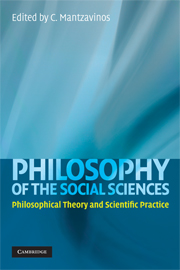Book contents
- Frontmatter
- Contents
- List of Contributors
- Acknowledgements
- Introduction
- Part I Basic Problems of Sociality
- Part II Laws and Explanation in the Social Sciences
- 4 Physicalism and the Human Sciences
- Comment
- 5 Complexity and Explanation in the Social Sciences
- Comment
- 6 The Heterogeneous Social: New Thinking About the Foundations of the Social Sciences
- Comment
- 7 What Is This Thing Called “Efficacy”?
- Comment
- Part III How Philosophy and the Social Sciences Can Enrich Each Other: Three Examples
- Epilogue
- Name Index
- Subject Index
- References
Comment
Randomized Controlled Trials and Public Policy
Published online by Cambridge University Press: 05 June 2012
- Frontmatter
- Contents
- List of Contributors
- Acknowledgements
- Introduction
- Part I Basic Problems of Sociality
- Part II Laws and Explanation in the Social Sciences
- 4 Physicalism and the Human Sciences
- Comment
- 5 Complexity and Explanation in the Social Sciences
- Comment
- 6 The Heterogeneous Social: New Thinking About the Foundations of the Social Sciences
- Comment
- 7 What Is This Thing Called “Efficacy”?
- Comment
- Part III How Philosophy and the Social Sciences Can Enrich Each Other: Three Examples
- Epilogue
- Name Index
- Subject Index
- References
Summary
In an inspiring chapter, Nancy Cartwright argues that there is a gap between efficacy and effectiveness. That is, if a randomized controlled trial (RCT) demonstrates that a cause has an effect (efficacy), this does not imply that the same cause–effect relation holds in the field (effectiveness). The term “field” refers to settings outside those of the original RCT. Bridging this gap, she argues, requires theory, or at least good reasons to think that the proper effect has been identified and is an enduring one, among others. Sound policymaking, she argues, depends on both RCTs and theory, and, without at least some theory, the evidential value of an RCT is made empty, that is, zero.
In this comment, I will apply her philosophical analysis to the “field” of health care. Screening programs for breast cancer have been established in many countries with the aim of saving lives. RCTs represent the scientific basis for these programs. How is the efficacy–effectiveness gap being dealt with in practice? I will argue that, in the world of cancer screening, the logical problem of induction as well as the lack of theory is pressing, and that the most recent Cochrane review ignores both, consistent with Cartwright's analysis. Moreover, I argue that health and government organizations do not seem to be interested to bridge the gap in the first place, but largely ignore the evidence provided by RCTs because of conflicts of interest, among others.
- Type
- Chapter
- Information
- Philosophy of the Social SciencesPhilosophical Theory and Scientific Practice, pp. 207 - 214Publisher: Cambridge University PressPrint publication year: 2009



